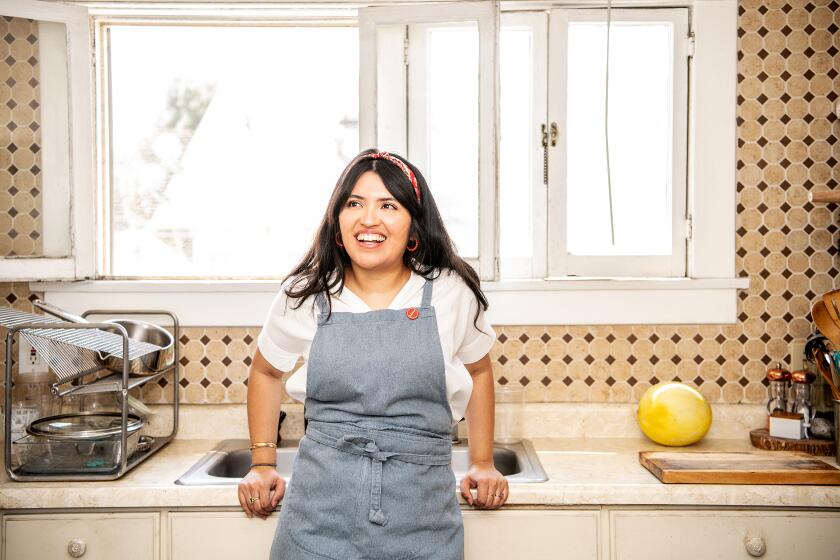Alma’s Ari Taymor drops in to make roasted carrots with chanterelles
- Share via
That chef Ari Taymor arrived by himself, carrying a small hotel pan stacked with plastic deli cups and kitchen towels, all haphazardly labeled with blue painter’s tape, was somehow fitting. Taymor’s restaurant, after all, began life as a traveling pop-up before establishing itself as a national dining destination. Even now, Alma is jigsawed into a nondescript building on South Broadway, a place that you might confuse with a bail bond office rather than one of the hottest restaurants in America.
On a recent morning in downtown Los Angeles, Taymor trekked the mile or so north from his tiny restaurant to this newspaper’s Test Kitchen to make a plate of carrots. He was demonstrating one of Alma’s recurrent dishes, a warm salad of roasted carrots and chanterelles that’s on Alma’s tasting menu and has been a standard, in various iterations, for the last two of Alma’s three years.
Taymor had on an apron over a gray sweatshirt and skinny black pants, his arms covered with tattoos, sockless feet in a pair of Converse sneakers. His accolades: Bon Appetit’s best new restaurant in 2013; Food & Wine’s best new chef in 2014; James Beard Rising Star Chef nominee this year. His tattoos: an Aristotle quote; a maple tree, to remind him of the one in his childhood yard in Palo Alto; “tout sera fini” or “everything will end,” which might remind him of his current legal woes (Taymor is in the middle of a wrenching lawsuit over Alma’s ownership) or might just be a footnote to his time as a philosophy major in college.
Recipe: Carrots, chanterelles, peaches and vadouvan
The chef, who is now 29, unpacks the hotel pan, lining up small bowls of ingredients on the kitchen counter. Butter-roasted baby carrots, sautéed chanterelles, dehydrated peaches, brown butter, vadouvan, peach soubise, a squeeze bottle of rice wine vinegar, nasturtiums, half an onion, a peach. The only thing he brought other than ingredients was his knife, handmade in Long Beach of carbon steel. In the austere kitchen setting, it looked like a prop from a Kurosawa film.
Taymor’s food is arty stuff, dishes orchestrated like still-life paintings, composed of foraged greenery, seasonal produce and highly curated ingredients. Although it can seem precious, it’s about flavor rather than artifice.
“I just love roasting carrots,” Taymor says as he warms the baby carrots he’d already roasted at Alma in a sauté pan. The current version of the dish is built around peaches, both dehydrated and fresh, that are added to the classic onion sauce called a soubise. “We wanted to find a way to use stone fruit differently. It has more dimensions than just dessert or cut raw.”
Taymor isn’t in the kitchen long. He points out that all the components of the dish can be made ahead — as he has done — and reheated, the assembly just a matter of temperature and aesthetics. He likes acid, hence the vinegar bottle. And he likes flavor, hence the vadouvan, an Indian spice mixture that Taymor makes over the course of three days. “We got mislabeled as a molecular restaurant. We’re just rustic.”
In the Kitchen: Sign up for our weekly cooking newsletter
While it’s possible that many L.A. diners, brought up on grilled cheese night at Campanile, might not use the word “rustic” to describe Taymor’s exquisite plates of seaweed and tofu beignets, sunchoke soup or Carpenter’s pigeon, the cooking at Alma isn’t as rarefied as you might think. And, yes, you can duplicate it at home without a culinary degree or a Noma obsession. You do not need to make your own three-day vadouvan but can instead pick it up from a spice shop. If you don’t have a dehydrator handy, just buy some dried peaches from your farmers market. Then all you really need to do is cook some carrots and mushrooms, make a blender sauce and pick some nasturtiums — the edible flowers grow like weeds in Southern California — from somewhere. Which is pretty rustic after all.
More to Read
Eat your way across L.A.
Get our weekly Tasting Notes newsletter for reviews, news and more.
You may occasionally receive promotional content from the Los Angeles Times.










